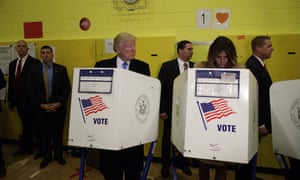Trump election group backs away from its request for voter data after outcry | US news
The Trump administration is backing away from its extraordinary attempt to gather voters’ personal information, following a barrage of legal challenges, an outcry from state officials, and a rash of voter registration cancellations by people concerned about their privacy.
Voting rights groups have filed at least six lawsuits in response to a letter sent out on 28 June by Kris Kobach, vice-chair of the presidential advisory commission on election integrity, asking state officials to provide names of the country’s 150 million voters. In addition, the letter sought voters’ addresses, social security numbers, voting histories, party affiliation, criminal histories, military status, and more.
Kobach has said the request is designed to help prevent fraudulent in-person voting. But his detractors say he is looking for a solution to a non-existent problem and suspect his true interest is in finding reasons to deny legitimate voters their rights, for partisan advantage.
Both Kobach and Trump have floated the notion that 3 to 5 million people voted illegally last November â€" a notion that has angered both Republican and Democratic election officials because there is no shred of evidence to support it.
Kobach’s letter told states to comply with his request by 15 July, but the White House has already postponed that deadline pending a ruling from the Washington DC circuit court on one of the lawsuits. That ruling is not due until next week at the earliest.
The commission has also abandoned plans to store the information on a temporary Pentagon computer and promised to have a dedicated White House server ready to receive the data by next week.
Not one state â€" not even Kansas, where Kobach is secretary of state and in charge of elections â€" has agreed to comply fully with the request. Many have cited privacy concerns and other legal restraints. Only three states, Colorado, Missouri and Tennessee, have indicated any enthusiasm about complying. Many more have responded with fury, including Mississippi, whose Republican secretary of state memorably told Kobach to “go jump in the Gulf of Mexicoâ€.
Maryland’s attorney general, Brian Frosh, called the request “repugnantâ€. “It appears designed only to intimidate voters,†he wrote, “and to indulge President Trump’s fantasy that he won the popular vote.â€
According to the lawsuits filed by the Electronic Privacy Information Center (Epic), the American Civil Liberties Union (ACLU) and others, Kobach’s request sidestepped clear legal requirements on privacy protection â€" the issue that prompted the White House to hold off on its deadline.
The suits also accuse the commission of working at a constitutionally intolerable level of secrecy, and Kobach himself of blurring the legal lines between his position as vice-chair and his candidacy in next year’s Kansas gubernatorial election.
Epic’s complaint and call for a temporary restraining order, filed this month, denounced the proposed voter database as “unnecessary and excessive†and said the commission risked violating “the informational privacy rights of millions of Americans†and exposed the country’s electoral system to potential new forms of registration and voter fraud. To make the information gathered by the commission public, it added, would be “both without precedent and crazyâ€.

Two of the suits, by the ACLU and the Lawyers’ Committee of Civil Rights Under Law, seek to postpone the presidential committee’s next meeting, set for next Thursday, unless the White House discloses its communications about the meeting and opens it to the public.
Voting rights activists are hoping that the legal and political pressure will induce the White House to drop the data-gathering exercise altogether. “The program was ill conceived and poorly executed,†Epic’s president and executive director Marc Rotenberg said in a statement. “We expect the commission will simply announce that it has no intention, going forward, to ask the states for their voter records.â€
Some damage, however, has already been done, as election officials in at least four states â€" Arizona, Colorado, Florida and North Carolina â€" report receiving requests from hundreds of voters to cancel their registrations to protect their personal information.
Local voting officials were bombarded with email requests and phone calls after the Kobach letter became public. In some cases, the officials talked voters out of cancelling their registrations, arguing that the data was in the system already and they would only be damaging themselves. In other cases, voters said straight out they did not trust the presidential commission. One North Carolina voter said it “smells funnyâ€.
The voter response in Arizona appears to have triggered a change in policy. The secretary of state there initially said she would be withholding social security numbers, dates of birth and other identifying details but otherwise complying with the request. By the time she sent her official response, however, the line had changed to a flat no.


0 Response to "Trump election group backs away from its request for voter data after outcry | US news"
Posting Komentar